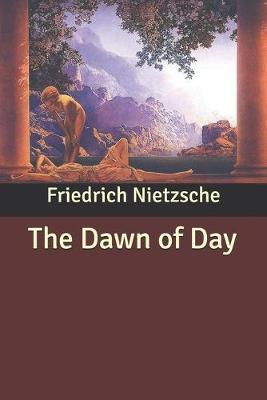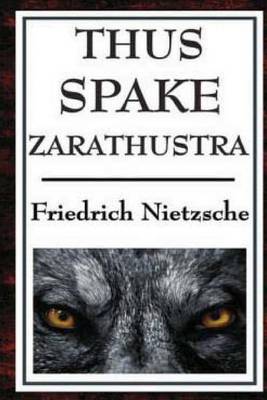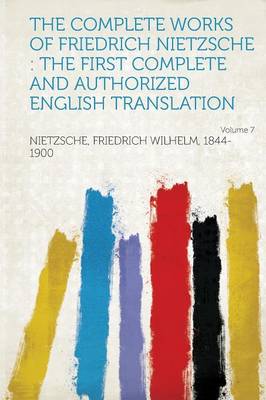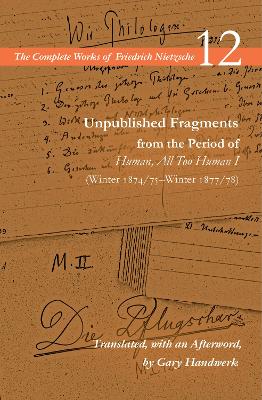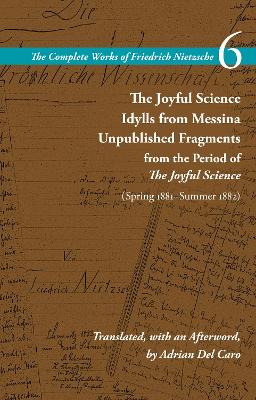Complete Works of Friedrich Nietzsche
2 primary works • 5 total works
Book 9
Book 11
Thus Spake Zarathustra is Nietzsche's masterpiece. Rich in irony, poetry, and symbolism, this unique volume presents the German philosopher's major concepts: the master and slave moralities, a pervasive will to power, the heroic overman transcending good and evil, and an eternal recurrence of the same dynamic universe.
This volume in The Complete Works presents the first English translations of Nietzsche's unpublished notebooks from Winter 1874/1875 through 1878, the period in which he developed the mixed aphoristic-essayistic mode that continued across the rest of his career. These notebooks comprise a range of different materials, including early drafts...
Read moreThis volume in The Complete Works presents the first English translations of Nietzsche's unpublished notebooks from Winter 1874/1875 through 1878, the period in which he developed the mixed aphoristic-essayistic mode that continued across the rest of his career. These notebooks comprise a range of different materials, including early drafts and near-final versions of aphorisms that would appear in both volumes of Human, All Too Human. Additionally, there are extensive notes for a never-completed Unfashionable Observation that was to be titled "We Philologists," early drafts for the final sections of "Richard Wagner in Bayreuth," plans for other possible publications, and detailed reading notes on philologists, philosophers, and historians of his era, including Friedrich August Wolf, Eugen Dühring, and Jacob Burckhardt.
Through this volume, readers gain insight into Nietzsche's emerging sense of himself as a composer of complexly orchestrated, stylistically innovative philosophical meditations—influenced by, but moving well beyond, the modes used by aphoristic precursors such as Goethe, La Rochefoucauld, Vauvenargues, and Schopenhauer. Further, these notebooks allow readers to trace more closely Nietzsche's development of ideas that remain central to his mature philosophy, such as the contrast between free and constrained spirits, the interplay of national, supra-national, and personal identities, and the cultural centrality of the process of Bildung as formation, education, and cultivation.
With this latest book in the series, Stanford continues its English-language publication of the famed Colli-Montinari edition of Nietzsche's complete works, which include the philosopher's notebooks and early unpublished writings. Scrupulously edited so as to establish a new standard for the field, each volume includes an Afterword that presents and contextualizes the material it contains.
Written on the threshold of Thus Spoke Zarathustra during a high point of social, intellectual and psychic vibrancy, The Joyful Science (frequently translated as The Gay Science) is one of Nietzsche's thematically tighter books. Here he debuts and practices the art of amor fati, love of fate, to explore...
Read moreWritten on the threshold of Thus Spoke Zarathustra during a high point of social, intellectual and psychic vibrancy, The Joyful Science (frequently translated as The Gay Science) is one of Nietzsche's thematically tighter books. Here he debuts and practices the art of amor fati, love of fate, to explore what is "species preserving" in relation to happiness (Book One); inspiration and the role of art as they keep us mentally fit for inhabiting a world dominated by science (Book Two); the challenges of living authentically and overcoming after the death of God (Book Three); and the crescendo of life affirmation in which Nietzsche revealed the doctrine of eternal recurrence and previewed the figure of Zarathustra (Book Four). Invigorated and motivated by Thus Spoke Zarathustra and Beyond Good and Evil, Nietzsche in 1887 added a new preface, an appendix of poems, and Book Five, where he deepened the critique of science and displayed a more genealogical approach.
This volume provides the first English translation of the Idylls from Messina and, more importantly, it includes the first English translation of the notebooks of 1881–1882, in which Nietzsche first formulated the eternal recurrence. Structurally and stylistically, The Joyful Science remains Nietzsche's most effective book of aphorisms, immediately after which he took on the voice and alter ego of Zarathustra in order to push beyond the boundaries of even the most liberating prose.
